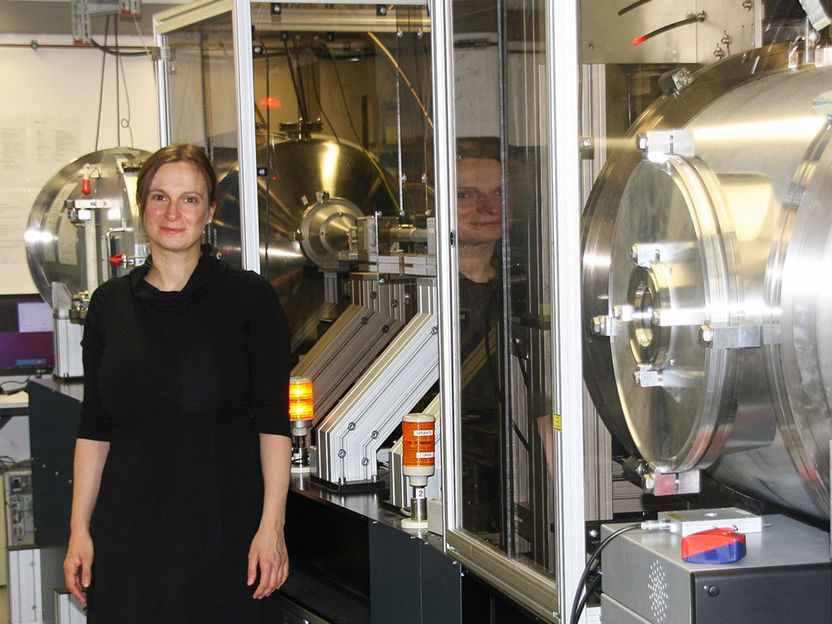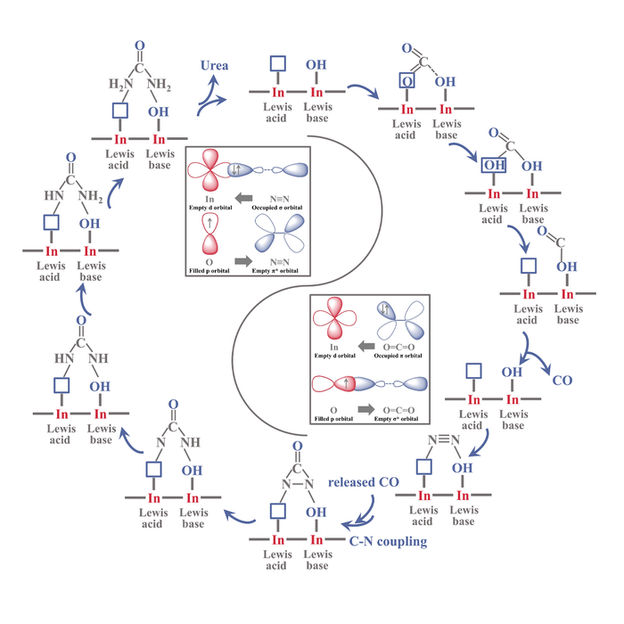Heinz Maier-Leibnitz Prize for research into crystallisation processes
Prof. Dr. Anna Schenk, Junior Professor for Colloidal Systems at the University of Bayreuth, receives one of this year's Heinz Maier-Leibnitz Prizes. The award worth € 20,000, is the most important prize for young scientists in Germany. A jury appointed by the German Research Foundation (DFG) and the Federal Ministry of Education and Research (BMBF) selected the Bayreuth physical chemist from 150 proposals submitted. A total of 10 researchers will be honoured with a Heinz Maier-Leibnitz Prize this year. The award ceremony is planned for 4 May 2021 as a virtual event.

Junior Professor Dr. Anna Schenk at the small-angle X-ray scattering facility of the "Mesoscale Characterization: Scattering Techniques" keylab at the Bavarian Polymer Institute (BPI).
UBT / C. Wißler
The Bayreuth prize winner's research focuses on bio-inspired crystallisation control. In this promising branch of research at the interface of physical chemistry, biology, and material sciences, the aim is to learn from nature in the design of complex materials tailored to specific technological applications. The key here is to understand the underlying mechanisms of mineral deposition and self-organisation. For example, inorganic crystal structures are used in numerous organisms to build hard tissues – for instance, in vertebrate bones, mussel shells, and snail shells. These crystal structures are often amazingly well adapted to their respective functions. The key factor here is their architecture. They consist of tiny mineral crystals, whose arrangement is determined by soft biomolecules.
"We are seeking to adopt the often very sophisticated construction principles of nature in order to then transfer them to artificial systems. Thereby we want to be able to specifically control the structures and functions of new materials, such as catalysts for water splitting, in the laboratory," says Jun.-Prof. Dr Schenk. With this goal, her working group studies physical and chemical processes of self-organisation all the way from the smallest nanoscale units to microscopically visible structures and larger components. "Linking these different length scales is an exciting challenge that is becoming increasingly important both in basic research and in innovative developments towards functional materials," says Schenk.
With her research work, the Bayreuth junior professor is involved in the Keylab "Mesoscale Characterization: Scattering Techniques" of the Bavarian Polymer Institute (BPI) and in the DFG Collaborative Research Centre 840 "From Particulate Nanosystems to Mesotechnology" at the University of Bayreuth, among other projects.
Science Minister Bernd Sibler acknowledges the high relevance of the Bayreuth prize winner's research work: "Junior Professor Dr Schenk’s research is truly pioneering work. Her unique combination of different concepts from various scientific disciplines stands to contribute to answering specific problems with regard to the Energiewende (nuclear and fossil fuel phase-out). Dr. Schenk's work is thus a prime example of visionary research at the very highest level in connection with one of the central issues for the future of our society. Having such a prize winner in the Free State of Bavaria naturally makes me very proud as Minister of Science! We are doing everything we can to offer excellent research conditions here with, among other things, our billion-dollar Hightech Agenda Bavaria innovation offensive."
Most read news
Organizations
Other news from the department science

Get the chemical industry in your inbox
By submitting this form you agree that LUMITOS AG will send you the newsletter(s) selected above by email. Your data will not be passed on to third parties. Your data will be stored and processed in accordance with our data protection regulations. LUMITOS may contact you by email for the purpose of advertising or market and opinion surveys. You can revoke your consent at any time without giving reasons to LUMITOS AG, Ernst-Augustin-Str. 2, 12489 Berlin, Germany or by e-mail at revoke@lumitos.com with effect for the future. In addition, each email contains a link to unsubscribe from the corresponding newsletter.




























































